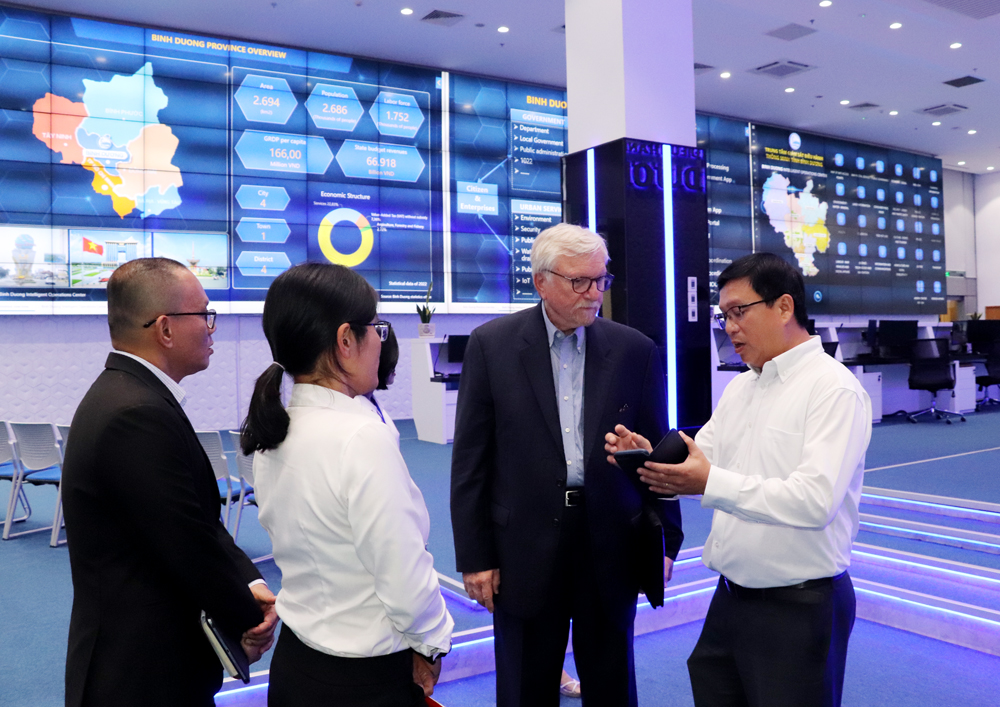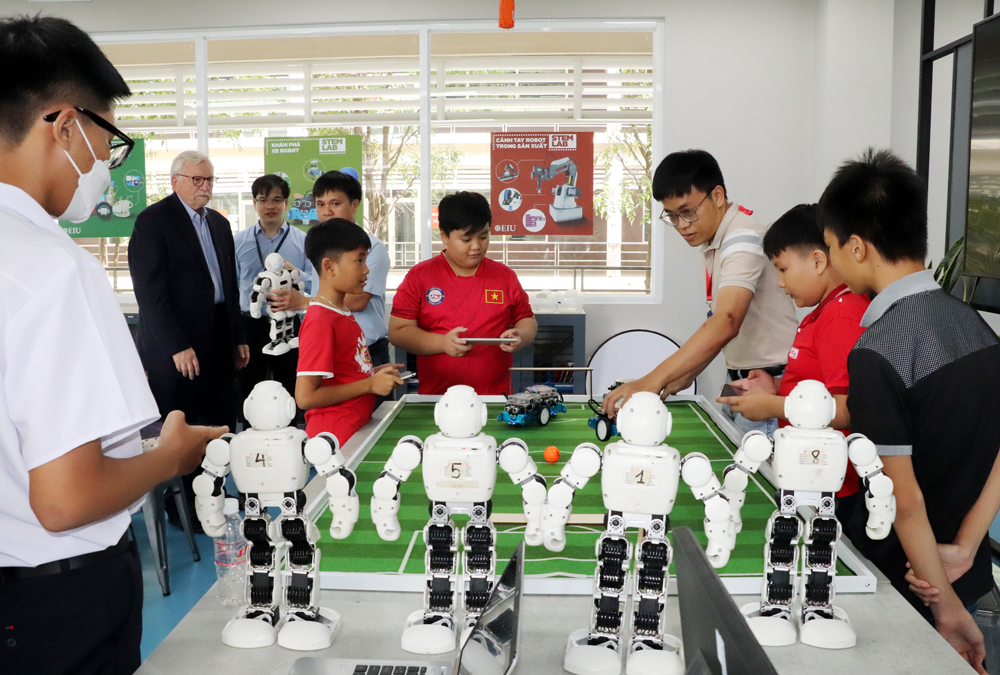PORTAL - After working days and field surveys, what do you feel about Binh Duong, sir?
Mr. John Jung: During my working days in Binh Duong, I was impressed with the changes in infrastructure and economic development, especially the province's orientation to transform from traditional industries to high value-added, advanced, environmentally friendly industries.
I feel this place is very special and I have been shared many interesting things. In the morning, I spent time walking in the New City park area and surrounding areas. I feel that the living environment here is very good.
I had the opportunity to meet with people in the community. I feel they are very happy. Through that, I see the element of caring for the community in Binh Duong. I went on a field survey and saw the provincial leaders' concern for the community, and was very impressed with the social housing program. This is a very special point in Binh Duong that is consistent with the province's characteristics to take care of workers, creating conditions for them to live together with family and relatives. From then on, they will stick with and work long term in Binh Duong.
In the past days I have learned many things and I will share this with many other communities around the world.
PORTAL: How do you evaluate the initial results achieved by Binh Duong in building a smart city associated with the 06 ICF's criteria, sir?
Mr. John Jung: 06 ICF's assessment criteria include: Broadband connectivity; knowledge workforce; innovation; digital equality; advocacy; sustainability. Binh Duong has guaranteed these criteria, and also has other special elements that are consistent with the local characteristics and culture that I see.
Specifically, the social housing program and educational services implemented by the province meet the needs of all people here, along with the atmosphere in this community that make me feel that everyone comes here, stays here, settles together happily.

Mr. John Jung listens to an introduction to the Provincial Intelligent Operation Center (IOC)
Binh Duong develops an innovation ecosystem according to the "Triplex Helix" model; invites all parties and partners to come and cooperate to build and achieve the success today.
I appreciate putting people at the center of development, giving priority to serving people and the community in building Binh Duong Smart City. Among them, the investment in building social housing in Binh Duong is a project that I am very impressed with. I think that social housing projects should be developed more so that people can have housing and feel secure in living and working in Binh Duong.
With the above factors, I believe that in the future, Binh Duong will continue to achieve comprehensive and sustainable results.
PORTAL: For Binh Duong, the Smart City Project is considered one of the province's strategic socio-economic development programs. How do you view this issue from ICF's perspective?
Mr. John Jung: The application of technology and use of data is of course essential when building a smart city. However, the most important thing, in my opinion, to build a smart city requires a comprehensive approach, not only technology and data but also covering education, innovation, creating channels to interact with the community, taking care of the vulnerable people and "leaving no one behind".
From the ICF's perspective, I think that focusing on innovation, transforming to green industry with high added value, investing in infrastructure, social housing, and education, etc. that Binh Duong is implementing is in the right direction. This is the direction for smart and sustainable development.
PORTAL: So, in your opinion, to achieve the set goals and results, what does Binh Duong need to implement in a comprehensive approach?
Mr. John Jung: In my opinion, the problem is not seeing short-term results, but the long-term vision to achieve the province's strategic goals is the important factor.
Binh Duong has applied the "Triplex helix" model, like Eindhoven City (Netherlands) which has been very successful in calling for the cooperation and synergy of all parties in the community. The issue here is cooperation between all stakeholders, especially leaders and inviting the participation of the enterprises and academic sectors. Through the days of surveying, I found that the province has implemented this model quite effectively with the participation of enterprises, universities, Community Initiative Center, etc. in building an innovation ecosystem.
The purpose of innovation is to bring prosperity and development to the community. Innovation is a very important factor towards success in our world smart community. With the results achieved in the first phase of building a smart city, Binh Duong needs to continue to strengthen Binh Duong Navigator in the new phase. ICF's criteria are the criteria included in the new phase in Binh Duong Navigator, not just infrastructure but must now simultaneously consolidate and upgrade education and training to improve the quality of human resources, innovation ecological model. In addition, there are also elements of community interaction, inclusiveness, and sustainability. In which all people and all classes will have equal access to digital technology.

ICF delegation visits TechLab and FabLab at Eastern International University
PORTAL: Currently, Binh Duong is building a Master Planning for the 2021-2030 period, with a vision to 2050. As an expert in the field of urban planning, from your experience and knowledge of urban planning, what do you share with the province in planning associated with the goal of building a smart community?
Mr. John Jung: I listened to the province share about the Provincial Planning for the 2021-2030 period, with a vision to 2050 being built. I think that the planning has clearly shaped the new development step of Binh Duong, associated with the criteria given by ICF.
I also have a few small comments about the planning. That is the province that needs to pay attention to the smart transportation system, serving the travel needs of the people; in the current 4.0 era, it is necessary to research and develop forms of transportation that apply high technology (such as self-driving cars, etc.) and pay attention to the development of waterway transportation systems and river tourism.
In addition, the province needs to prioritize creating space for people to live, play and entertain, increase green space, continue to promote the construction of social housing for workers, etc. to make Binh Duong a place worth living, a place to attract and retain talent.
Binh Duong also needs to assess the social impact of relocating manufacturing plants from the South to Northern industrial zones and clusters, paying attention to resettlement and ensuring support services in the new area. At the same time, the province also needs to be ready with a flexible response plan to challenges such as epidemics, environmental changes, and climate change for sustainable development.
Binh Duong is on the right track in smart, sustainable development - this is the general trend of the world. However, in my opinion, Binh Duong needs to continue to invest in image, brand and widely promote so that the world knows about Binh Duong. In my position at ICF, I will actively share Binh Duong's story with other communities so that Binh Duong becomes more known.
Thank you very much!